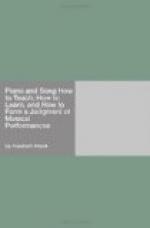* * * * *
Must we again and again explain to German composers that, though we do not require them to compose in Italian, they ought, at least, to learn to write in German in a manner suited for singing? otherwise, in their amazing ignorance and infatuation, they will wear out the powers of opera singers, and torture the public, apparently without a suspicion that it is possible to write both grand and light operas with true, characteristic German thoroughness. Even German opera requires a constant attention to the right use of the voice, and a methodical, effective mode of singing. It tolerates no murderous attacks on single male and female voices, or on the full opera company; it is opposed to that eager searching after superficial effect, which every sincere friend of the opera must lament.
Is it, then, so difficult to obtain the requisite knowledge of the human voice, and to study the scores of Gluck, Haydn, Mozart, Rossini, Bellini, and Donizetti with a special regard to this? Do our vocal composers make too great a sacrifice to their creative genius in making a study of those things which are essential? You consider it mortifying to inquire of those who understand singing, and you are sensitive about any disturbance of your vain over-estimate of your own powers; but you are not ashamed to cause the destruction of man’s noblest gift,—the human voice! If taste, feeling, and a fine ear are, and always must be, the chief requirements in composing for the great public, I ask you how you can lay claim to these three trifles, when you constantly violate them?
COMPOSER. If Mrs. N. had executed my aria to-day in as earnest and masterly a style, and with as agreeable a voice, as she did that of Rossini yesterday, she would have given as much satisfaction; for it is much more interesting and expressive both musically and harmonically, and written with more dramatic effect.
SINGER. You make a mistake, and you always will do so, as long as you consider the study of the voice as of secondary importance, or, in fact, pay no attention whatever to it. The latter aria, which is composed with a regard to the voice, and to the employment of its most agreeable tones, puts me into a comfortable mood, and gives me a feeling of success; yours, on the contrary, into one of dissatisfaction and anticipation of failure. Of what importance is the musical value of a composition, if it can only be sung with doubtful success, and if the voice is obliged to struggle with it, instead of having it under control? You attach less importance to the free, agreeable exercise of the voice than does the unanimous public. I do not wish to excite compassion, but to give pleasure by a beautifully developed style of singing. You pay some attention to adaptability to the piano or the violin: why are you usually regardless of fitness for the voice?




